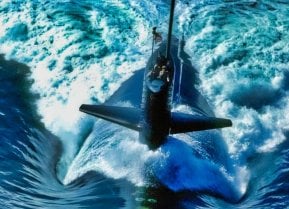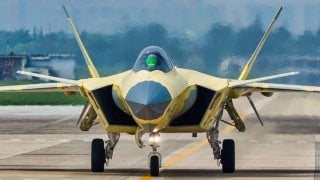Escalation Without Nuclear War: What Will China Learn from Ukraine’s Kursk Offensive?
Russia’s superior military power potential and its massive nuclear arsenal failed to prevent conventional attacks on its soil in the ongoing Ukraine war. What does China think about that?
Following Russia’s invasion of Ukraine in February 2022, Kyiv has engaged in numerous instances of artillery, missile, and drone attacks and sabotage on the Russian homeland, including against Moscow.
More daringly, since 2023, Ukraine has launched ground incursions within Russia proper. Russian dissident groups under Ukrainian service entered the Belgorod, Bryansk, and Kursk Oblasts several times. The most recent one started in August 2024 across the border with the Kursk Oblast. It is a high-profile operation encompassing elements from several brigades. At the time of writing, several Russian settlements are still under Ukrainian control.
The fact that these attacks happen in the first place is rather surprising. One would expect a weak state like Ukraine to be wary of breaching the territory of a nuclear great power. Striking Russian strategic assets and the capital city are already risky moves. Entering Russian territory with ground forces could be considered by the Kremlin an existential threat worthy of a nuclear response.
Yet, the Ukrainians did it anyway, and the Russians have refrained from escalating the conflict to the nuclear level. Russia’s superior power potential and its massive nuclear arsenal failed to prevent conventional attacks on its soil.
Another nuclear great power is China. It has beef with many neighbors, and some suspect it is considering attacks of its own, especially against Taiwan. Beijing could thus soon be in Russia’s position. Therefore, understanding Russia’s response to Ukrainian attacks might teach lessons about Chinese escalation thresholds during a conventional war.
Ukrainian operations present two explanations for Russia’s passivity.
First, Kyiv is a middle-sized power with finite military capabilities, while Russia is a gigantic state. Therefore, Ukraine is unlikely to inflict a decisive, strategic defeat through small incursions and various other attacks. Moreover, it is too weak to threaten the survival of the Russian state and government. Moscow’s forces know they will ultimately recapture the lost grounds. Ukraine does not have the staying power to fend off Russian counterattacks forever and would eventually have to leave or find a political settlement. Since the Russians could retake their territory through conventional means, nuclear use is unnecessary.
Second, the territories Ukraine seized had little strategic importance. They mainly consisted of border villages and small towns. However, had the Ukrainians seriously threatened key cities like Belgorod or even Kursk, Russia would have no doubt considered nuclear use to salvage the situation. Indeed, there are traces of evidence that the Kremlin considered a nuclear attack in October 2022 to stop the Ukrainian counteroffensive toward Kherson.
In summary, Russia refrained from escalating because it was confident in its ability to push back the Ukrainians, who never threatened key interests. Conversely, if the attack had emanated from a more potent enemy like NATO or if it had targeted something of high-value, Moscow might have used nuclear weapons. This matches other historical cases of nuclear powers under attack. The United States in Korea in 1950, Israel in 1973, Britain in 1982, and India in 1999 all eschewed nuclear use because conventional solutions were available, and the state’s core remained intact.
These insights seem to validate Taiwan’s purported plans to strike Chinese territory with cruise missiles in case of an invasion. Like Ukraine, Taiwan is weaker than its more powerful neighbor and cannot threaten the survival of the Chinese state. Hence, if the Russian case serves as a yardstick, Beijing would not escalate following Taiwanese strikes. Similarly, other smaller neighbors like Vietnam, the Philippines, Japan, South Korea, and Australia should be able to get away relatively unscathed if they were to attack Chinese territory for whatever reason during a conflict.
Things get more complex regarding more potent rivals like India and the United States. The Sino-Indian border dispute could easily spiral out of control. However, unlike Taiwan, India is a massive country with a large military. If India were to seize Chinese territory, it might confront Beijing with a tricky dilemma. Dislodging entrenched Indian forces in the Himalayan Mountains through conventional forces alone would be extremely costly and bloody. At the same time, an Indian border incursion would not threaten anything essential. Escalation would be a real possibility but not guaranteed.
For the United States, munching on Chinese territory on the margins might be possible. One could notably imagine U.S. forces securing islands in the South China Sea without nuclear escalation since these are hardly strategic assets for the Chinese state’s survival. A bombing campaign and small special forces attack against Chinese mainland military targets may even go unpunished. However, since the United States is a formidable rival, anything above that might elicit a desperate response from Beijing.
Washington may thus have more leeway to escalate against China than some may believe, but attacks against nuclear assets and the political leadership would certainly spell trouble. American leaders may still have to choose between intensifying conventional attacks to win the war but risk nuclear escalation or avoiding escalation but risk losing the upper hand in the conventional domain.
This does not imply that even limited attacks against the Chinese mainland would be without consequences. Although Moscow did not escalate to the nuclear level, attacks within Russia might have hardened the Kremlin’s and the Russian people’s resolution to prosecute the war. It also retaliated by harming Western interests elsewhere. Limited attacks against China would surely come with retaliations, but hopefully not nuclear.
About the Author:
Dylan Motin holds a Ph.D. in political science. He is currently a Non-resident Kelly Fellow at the Pacific Forum. He is also a non-resident fellow at the European Centre for North Korean Studies and a non-resident research fellow at the ROK Forum for Nuclear Strategy. He is the author of Bandwagoning in International Relations: China, Russia, and Their Neighbors (Vernon Press, 2024).
Image: Creative Commons.


